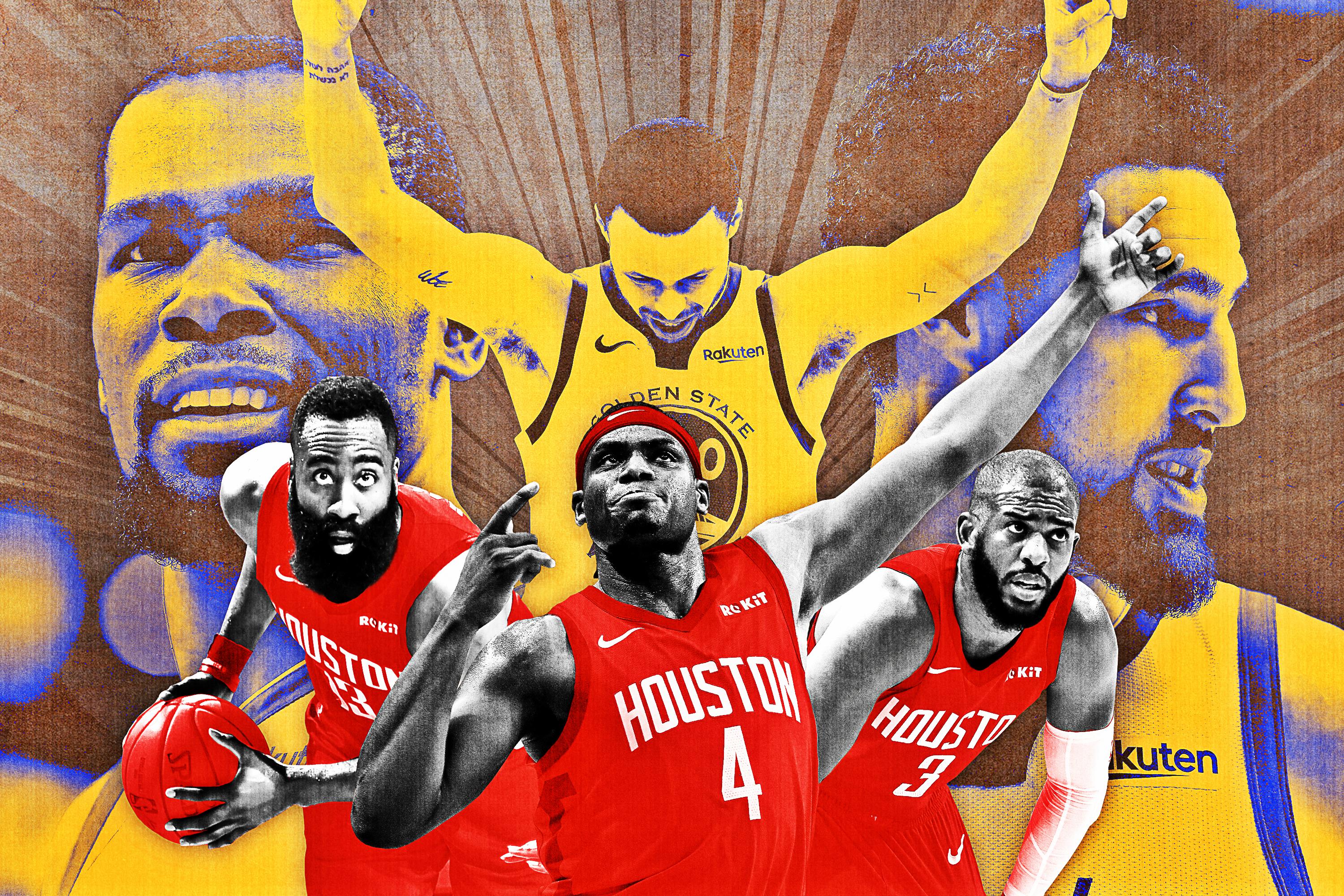
The Houston Rockets have a different kind of team this season. James Harden and Chris Paul are still the centerpieces of their offense, but the supporting cast around them has changed. Instead of filling out their rotation with long, defensive-minded wings like Trevor Ariza and Luc Richard Mbah a Moute, they have a smaller but more explosive bunch of perimeter players coming off their bench, led by Danuel House and Austin Rivers. They have exchanged versatility on defense for versatility on offense. Trying to build a team that can match up with the Golden State Warriors, whom they will face in the second round of the playoffs, is an exercise in trade-offs. No one has found the right balance yet.
Houston doesn’t have the same structural advantages against Golden State that they do against most teams. Their offense is built around creating enough space for Harden and Paul to carve up defenses in the pick-and-roll. Their two stars command so much attention on those plays that it creates lobs at the rim for Clint Capela, and open 3s for everyone else. That formula doesn’t work as well against the Warriors. Golden State is one of the few teams with enough mobile big men and long and athletic wings to switch screens across all five positions, allowing the other three defenders on the floor to stay at home on their men.
Golden State exposed the limitations of Houston’s role players in last year’s Western Conference finals. Eric Gordon, their sixth man, was the only other player in their rotation who could create his own shot. Everyone else needed to be spoon-fed open looks. The constant switching eliminated the ball movement those players needed to thrive, forcing Harden and Paul to do almost everything. The Rockets might have won anyway had Paul not gone down with a hamstring strain at the end of Game 5, but the strain was wearing on his body over the course of the series. They had no margin for error, and not enough relief coming off their bench.
Houston has more sources of offense this time around. Gordon is now starting in place of Ariza, giving the Rockets a third shot-creator in the starting lineup. They brought in Rivers, who has resurrected his career after being traded twice in six months, to take Gordon’s spot on the bench. Rivers is more than a meme these days; in Houston, he’s proved to be a well-rounded player who can slide between a number of different roles: He can score at a high level in isolations (81st percentile among all NBA players this season), take enough 3s to keep the defense honest (4.3 attempts per game), and be a credible playmaker (2.5-to-1 assist-to-turnover ratio).
But their most important addition is someone whom the average fan may not know yet. House bounced around the NBA for a few years after going undrafted out of Texas A&M; he even went to training camp with Golden State this season. Like Rivers, House has found the perfect situation in Houston. The 25-year-old has everything the Rockets need in a wing: the size (6-foot-7 and 220 pounds) and athleticism to slide between multiple positions on defense, the shooting ability (41.6 percent from 3 on 4.6 attempts per game) to space the floor on offense, and a surprising amount of creativity off the dribble when attacking closeouts. House isn’t a one-dimensional shooter. He can threaten the defense even when he’s not getting wide-open shots.
The differences between House and Ariza reflect the differences between the two versions of the Rockets. Ariza was a good 3-point shooter last season (36.8 percent from 3 on 6.9 attempts per game), but only when he had enough time to set his feet before shooting. He couldn’t shoot off movement, or score when defenders forced him to put the ball on the floor. According to the tracking numbers at Synergy Sports, he was in the 21st percentile of players when shooting off the dribble last season, and in the ninth percentile when finishing around the rim. House is in the 94th percentile in the former category this season, and the 45th percentile in the latter. Houston doesn’t run many plays for House, either, but he can do more to finish plays than his predecessor.
The offensive upgrades that Rivers and House provide come at a cost, though. They can’t do nearly as much on defense as Ariza and Mbah a Moute, two experienced 6-foot-8 combo forwards who could defend players at all five positions. Rivers is a tough-minded player who isn’t afraid to stick his nose out on defense, but he’s a smaller guard (6-foot-4 and 200 pounds) with a scrawny frame. And while House has the physical tools to be a perimeter stopper, he’s still an inconsistent young defender more prone to mental mistakes than Ariza and Mbah a Moute. The latter former Rocket didn’t play much in the Golden State series because he was struggling with a shoulder injury, but the former was everywhere, doing enough to at least frustrate Kevin Durant and make him work for his points.
The Rockets were a defensive machine last season, and their strength came from their ability to switch every screen. Unlike the Warriors, who gave minutes to several traditional big men and only went to smaller lineups in the playoffs, they started a center (Capela) who could guard on the perimeter. They were able to install their scheme in Day 1 of training camp and perfect it over the course of the season. Everyone understood their role, and exactly where they needed to be on a given possession. They played on a string against the Warriors, with few defensive breakdowns. The series was a war of attrition the Rockets almost won. Neither team could generate much ball movement. Everything came off difficult one-on-one moves.
Houston is still a great defensive team, but they may not be able to get to the same level this time around. House and Rivers joined the team in the middle of the season so they don’t have nearly as much continuity, while their team-wide lack of perimeter length has made them play a more conventional style without as much switching. Capela is their only starter taller than 6-foot-6. They used one lineup against Utah where Harden was flanked by Paul, Gordon, and Rivers, making him the tallest perimeter player on the floor at 6-foot-5. Gordon, at 6-foot-4, was their primary perimeter stopper in the series, and he did a phenomenal job on Donovan Mitchell. But the Jazz didn’t have any players taller than Mitchell (6-foot-3) who could create their own shot; the Warriors have a roster full of them.
It could be harder for the Rockets to match up when both teams go small. Capela, unlike most big men, survived on defense against the Warriors, but he wasn’t effective on offense. He couldn’t score against smaller defenders on switches or space the floor. Their best lineups against Golden State came with P.J. Tucker at the 5, but they may not be able to hold up as well on defense this season. Small-ball is a misleading name. The key to making lineups with smaller centers work is having length and athleticism at other positions to make up for it. Lineups with Draymond Green at the 5 wouldn’t be nearly as dominant were he not playing with bigger wings like Durant, Klay Thompson, Andre Iguodala, and Shaun Livingston.
House is the X factor for Houston in the series. He’s the Rockets’ only wing who won’t be dwarfed by his counterpart. He was up-and-down against Utah, averaging 6.2 points per game on 32.3 percent shooting. Like a lot of young players in the postseason, he was better at home than on the road: House shot 8-for-20 from the field (40 percent) in three games in Houston, and 2-for-11 (18.2 percent) in two games in Salt Lake City. The Rockets won’t have home-court advantage against the Warriors. They will need to win at least one game in Oracle Arena, and they can’t afford for House to lose his confidence if a few shots don’t go down, or let any offensive struggles impact his defense.
Houston head coach Mike D’Antoni might have to dig deep into his rotation for an unlikely hero at some point in the next two weeks. House was their only reserve who played more than nine minutes in Wednesday’s series-clinching Game 5 against Utah. Their backup big men—Kenneth Faried and Nene—will have a hard time staying on the floor when Golden State goes small. Depth was an issue for them last season, too. They were playing only seven guys even before Paul went down. Seldom-used reserves like Iman Shumpert and Gary Clark might end up having to buy crucial minutes for their stars. Every minute matters at this stage of the playoffs.
The Warriors looked lethargic against the Clippers in the first round. A series with the Rockets will be different. The loss of DeMarcus Cousins simplifies their center rotation. They will be much quicker to go with Draymond and Kevon Looney at the 5 instead of a traditional big man like Andrew Bogut who can’t defend in space. Golden State can save its small-ball lineups until it needs them against most of the league, but there is no time to waste against Houston. Everything the Rockets have done over the last few seasons has been in preparation for this moment. They came this close to pulling off the upset last season with a defensive-minded team around Harden and Paul. The hope this season is that a more balanced mix of defense and offense can push them over the top.

